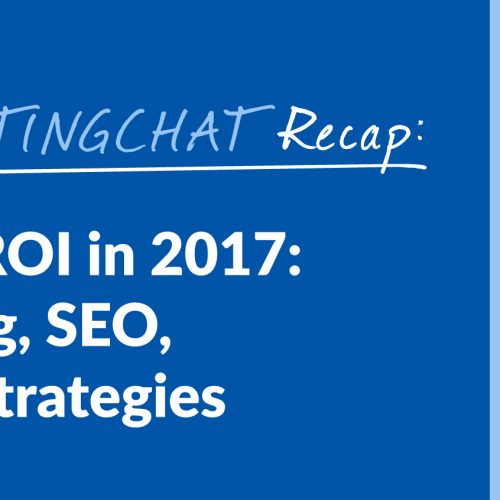#ContentWritingChat Recap: Blogging for ROI in 2017: Where to Blog, SEO, and Writing Strategies with Julia McCoy
Are you curious about blogging for ROI in 2017? That’s what we covered in our latest round of #ContentWritingChat! And if you missed out, you’re in luck because we’ve created a recap for you and it’s filled with awesome tips. Keep reading to check it out! Blogging for ROI in 2017: Where to Blog, SEO, and Writing Strategies with Julia McCoy Join us for #ContentWritingChat TOMORROW at 10 AM CST! Our CEO, @JuliaEMcCoy, will be guest hosting! pic.twitter.com/h8rYfvYvX8 — Express Writers (@ExpWriters) February 14, 2017 For this week’s chat, our very own CEO stepped in to guest host. Julia McCoy shared her expertise on blogging for ROI in 2017 and offered some amazing tips for writing, SEO, and where you should be blogging this year. We covered some of the key topics to help you succeed as a blogger this year, so make sure you read through them and start implementing this advice for yourself! Q1: For those that aren’t convinced, why is blogging still so important for brands? The reality is, many brands still aren’t convinced that blogging is worth their time. They don’t realize the value that it can provide to their audience and their brand overall. So, let’s convince them why they should be blogging! Here are just some reasons blogging is important for brands: A1 Consistent blogging is a WINNER. This graph shows us outranking million $+ funded competitors, solely from blogging. #ContentWritingChat pic.twitter.com/saEk6raPvF — Julia McCoy ? (@JuliaEMcCoy) February 14, 2017 A1 Just a few awesome stats on why every brand should blog. (from https://t.co/l6E0VrwJlI) #ContentWritingChat pic.twitter.com/3Bey4oIe5z — Julia McCoy ? (@JuliaEMcCoy) February 14, 2017 Julia knows that blogging is a must for brands! She even shared some pretty impressive data that backs it up. The graph above shows Express Writers outranking major competitors solely from blogging. She also shared some stats that are sure to convince you of the importance of starting your own blog this year. A1: Blogging is a lead generation opportunity. It’s how you can build influence, which draws in an interested audience. #contentwritingchat — Annaliese Henwood (@MktgInnovator) February 14, 2017 As Annaliese said, blogging is a lead generation opportunity. So many people will stumble upon your blog and want to do business with you because of the content you share. She also said blogging helps you build influence, which is key to drawing in your audience. A1) It’s a way to establish an authentic, authoritative voice that YOU control. Your thoughts, your words…it’s genuine #ContentWritingChat pic.twitter.com/CsGRfImgTN — Jason Schemmel (@JasonSchemmel) February 14, 2017 Jason knows that blogging is a powerful way to establish an authentic, authoritative voice. Your blog is your place to share your thoughts with your audience. A1: Blogging is a great way to show your expertise to the industry. It also helps you connect with your audience. #contentwritingchat — Netvantage Marketing (@netvantage) February 14, 2017 Blogging is an opportunity to show off your expertise to your industry, but also to your audience. It’s a great way to connect with your audience and to start building a relationship with them. A1: Blogging is important because it allows brands to expand their audience, share more information, and establish voice #ContentWritingChat — Josh Lawson (@JoshKLawson) February 14, 2017 To put it simply, blogging is an opportunity to expand your audience, share quality information with readers, and can help you establish your voice as a brand. A1. Social media is just rented properties while your blog is your real estate #contentwritingchat — Cheval John (@chevd80) February 14, 2017 Cheval’s advice is important to keep in mind. Social media is like rented property when you think about it. You don’t own the platform, nor can you count on it to always be around. If a social media platform shuts down, you’re going to lose your followers and everything you’ve worked so hard to build (unless you’ve successfully converted them to readers, subscribers, and customers). Your blog, however, is one place that you truly own and are in control of. Q2: Where should you blog this year besides your own website? Discuss how to find the right platforms. While blogging on your own website is great, blogging on other sites can provide major results. There are a lot of benefits to guest blogging, but it’s all about choosing the right places to post if you want to make it work for your brand. Keep these tips in mind: A2 Create a target persona then study the publications they share. THAT’S where you want to blog https://t.co/FBSVmRvRxb #ContentWritingChat pic.twitter.com/cRvVTrCOk0 — Julia McCoy ? (@JuliaEMcCoy) February 14, 2017 Julia recommends creating a target persona for your audience so you know what they’re like. You can figure out their demographics and also what sites they’re reading on the web. That’s where you should be sharing your content! Check out the blog post she linked for more information on creating your own target persona. A2: Guest blog on the websites YOUR audience is reading. Find out where they spend their time online and BE THERE. #ContentWritingChat — Rachel (@redheadrachel) February 14, 2017 The key to choosing the sites to guest blog on is figuring out where your audience spends their time online. You want to post on the sites that your target audiences reads so they’ll discover you and head over to your website. A2) Find popular blogs within your wheelhouse & be a guest blogger. That exposes your content to a broader audience #ContentWritingChat pic.twitter.com/5vB7ffeUe4 — Jason Schemmel (@JasonSchemmel) February 14, 2017 Jason also knows the importance of finding the popular blogs in your wheelhouse and guest posting there. It’s the best way for you to reach your target audience and hopefully make them a fan of your brand. A2 Industry specific forums, Guest blog on Authority sites, Quora, Reddit, #LinkedIn are few great places #ContentWritingChat https://t.co/8bhBiI9RFQ — Varun Kumar ? (@DigitalVK) February 14, 2017 Varun recommends posting on forums that are specific to your industry, guest blogging on authority websites, and also using platforms … Read more

